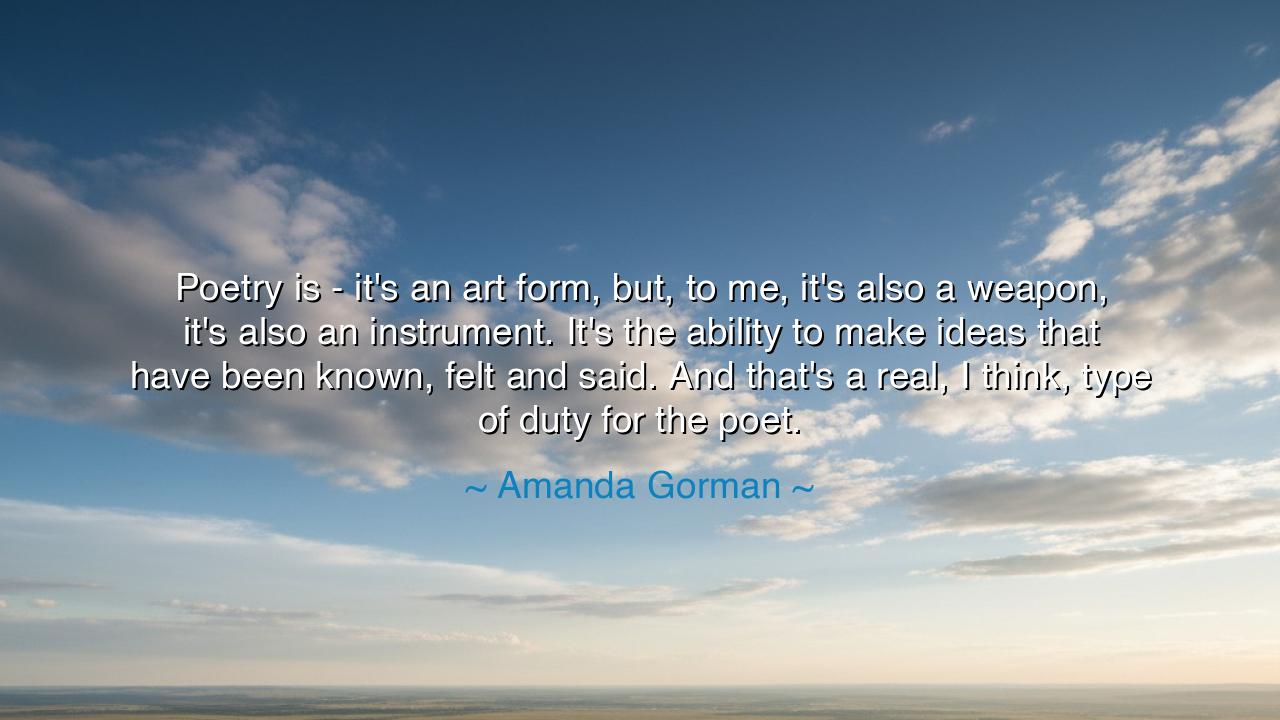
Poetry is - it's an art form, but, to me, it's also a weapon
Poetry is - it's an art form, but, to me, it's also a weapon, it's also an instrument. It's the ability to make ideas that have been known, felt and said. And that's a real, I think, type of duty for the poet.






The young oracle of our time, Amanda Gorman, spoke with a voice both ancient and new when she declared: “Poetry is – it’s an art form, but, to me, it’s also a weapon, it’s also an instrument. It’s the ability to make ideas that have been known, felt and said. And that’s a real, I think, type of duty for the poet.” These words carry the flame of responsibility, for she does not see poetry as mere beauty, nor as simple ornament for the heart, but as weapon and instrument—a force capable of shaping the destiny of nations and awakening the spirit of humankind.
To call poetry a weapon is to honor its power. For though it does not pierce flesh like the sword, it pierces the conscience of kings, the hearts of crowds, the minds of generations. Tyrants fear poets, not because they rhyme, but because they speak truths that cannot be silenced. Poetry makes visible the invisible suffering of the poor, the dignity of the forgotten, the cry for justice that lies hidden in the shadows. Gorman reminds us that a true poem is not a whisper to the self, but a cry that can ignite a people.
But she also calls poetry an instrument. Where the weapon wounds, the instrument heals, teaches, and harmonizes. Poetry becomes a lyre in the hands of the poet, turning pain into song, chaos into rhythm, despair into vision. Through this duality—both weapon and instrument—poetry reveals its sacred duty: to wound injustice and to heal the broken spirit. This is why she speaks of duty, for to wield poetry is not simply to create, but to serve. The poet must speak what is known but silenced, what is felt but unspoken, what is said yet unheard.
History offers us luminous examples. Consider Maya Angelou, whose words—“Still I Rise”—rose not as a mere poem, but as a weapon against the crushing weight of racism and sexism, and as an instrument of healing for those long silenced. Or Pablo Neruda, whose verses gave voice to the suffering of his people, shaping political consciousness through imagery more powerful than armies. Or even Homer, whose epic poetry bound together the Greek people, shaping their identity for centuries. Each poet bore the weight of this sacred duty: to transform language into something that strikes and soothes, wounds and heals, all at once.
Amanda Gorman herself lived this truth. When she stood before the world at a presidential inauguration and spoke “The Hill We Climb”, she was not entertaining but summoning. Her poem became a weapon against despair, against division, against hopelessness. It was also an instrument that tuned the hearts of millions to a higher harmony, reminding them of resilience, courage, and unity. Her words lived the very essence of her quote: poetry as art, poetry as duty, poetry as the bridge between the known and the unknown.
The meaning, then, is clear: poetry is power—not soft power alone, but the sharp and enduring kind. It is the one form of language that refuses to die, for it enters the soul more deeply than law, more lastingly than decree. Gorman teaches us that poets are not mere dreamers but guardians, defenders, and healers, charged with the task of carrying the collective spirit of their people in concentrated fire.
The lesson for us is this: honor poetry not only as art but as responsibility. When you write, do not seek only beauty, but truth. When you read, do not take poetry as ornament, but as nourishment and weaponry for your own heart. Ask yourself: What injustice needs my words? What silence demands to be broken? What harmony must be restored? And when you find the answer, speak, even if your voice trembles.
Thus remember Amanda Gorman’s wisdom: the poet’s duty is to wield words as both sword and song. Poetry is the flame that cuts away falsehood, and the music that binds the soul to the universe. To write is to fight, to heal, and to serve. Let each of us who dares to speak carry this responsibility, for in the end, it is the poet’s words—not the empire’s armies—that endure.






AAdministratorAdministrator
Welcome, honored guests. Please leave a comment, we will respond soon